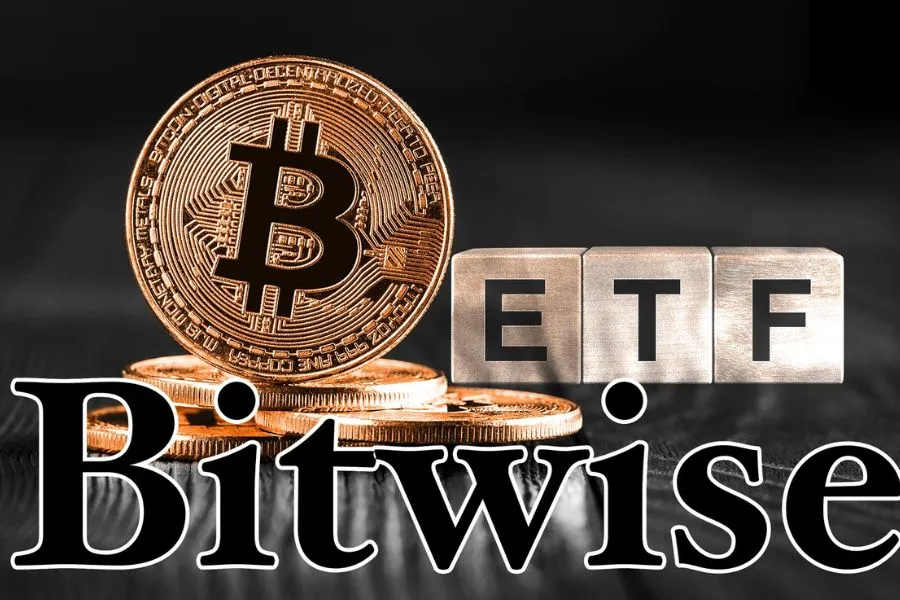The Bitwise 10 Crypto Index Fund (trading under ticker: BITW) is no ordinary fund. Unlike Bitcoin-only ETFs, this one offers a diversified basket of the top 10 cryptocurrencies by market cap. That includes big names like Bitcoin and Ethereum, but also rising stars like Solana, Chainlink, and Uniswap.
Essentially, it mirrors the structure of a traditional index fund—except instead of stocks, it tracks the crypto market’s elite. Think of it as the S&P 500 of crypto—minus the 490 extras.
This structure offers two big benefits to investors: diversification and reduced volatility (well, “reduced” is relative in crypto terms). It’s designed for people who want broader exposure to the market without having to pick and manage individual coins.
Table of Contents
The SEC’s Initial Approval — A Step Toward Diversified Crypto ETFs
So when the U.S. Securities and Exchange Commission (SEC) gave an initial thumbs-up to Bitwise’s plan to convert BITW into a spot crypto ETF, it was a big deal.
Why? Because until now, all SEC-approved crypto ETFs have been laser-focused on Bitcoin—no Ethereum, no Solana, no nothing else. This marked the first serious movement toward a multi-asset crypto ETF in the U.S., signaling that regulators may finally be loosening their tight grip on diversified digital asset products.
Crypto investors and institutional players saw it as a green light—albeit a flickering one—for broader acceptance of crypto as a legitimate asset class.
Why the Pause? Inside the Sudden Regulatory U-Turn
But just as quickly as the champagne bottles were being opened, the SEC tapped the brakes.
While the approval was technically granted, the SEC then put the decision on hold, requesting more documentation and time for internal review. In classic SEC fashion, they didn’t say “no”—just “not yet.”
So what happened?
Also Read: Coinbase and PNC Join Forces: Crypto Comes to Main Street Banking
Sources suggest that the pause was less about the assets themselves and more about structural concerns—like how custody, pricing, and liquidity will be managed across multiple tokens in one ETF. The agency also wants to ensure investor protection mechanisms are rock-solid before giving full clearance.
In other words, it’s not a total rejection—but a cold shower for anyone who thought we were on the fast track to diversified crypto ETFs.
What Sets Bitwise’s ETF Apart From Bitcoin-Only Funds?
There’s a reason why Bitwise’s fund stood out: it’s multi-token and market-cap weighted, automatically adjusting to reflect the top 10 coins. That means if a project like Polkadot drops out of the top 10, it gets replaced. The fund evolves with the market.

By contrast, most SEC-approved crypto ETFs (like BlackRock’s and Fidelity’s) are Bitcoin-only. Some Ethereum-focused products are inching toward approval, but Bitwise is pushing the envelope by bundling 10 assets together—each with different use cases, networks, and risk profiles.
From a retail investor’s standpoint, Bitwise’s model is far more comprehensive and accessible, reducing the need to research and allocate across multiple tokens individually.
How the Market Reacted to the Approval and Pause
Initially, news of the SEC’s tentative approval boosted confidence in the altcoin market, particularly coins listed in the Bitwise 10. Ethereum, Solana, and Uniswap all saw mild gains as traders speculated on increased institutional demand.
However, the pause triggered a mini pullback, with cautious optimism replacing the brief euphoria. Bitwise’s fund, BITW, experienced mild volatility, reflecting investor confusion over what the SEC’s mixed messaging means.
Some analysts believe that the market overreacted to the pause, pointing out that regulatory delays are par for the course with the SEC. Others see it as a sign that broader altcoin exposure through ETFs could still be years away.
What This Means for Other Crypto ETF Applications
Bitwise isn’t alone in this game. Grayscale, for example, has also filed to launch multi-crypto ETFs and convert other trust products into ETFs. So far, the SEC has dragged its feet on those applications, too.
Also Read: Altcoins to Watch in 2025: Underrated Projects That Could Explode
The pause on Bitwise likely sends a message to other asset managers: if you want approval, come with your paperwork tight and your risk frameworks even tighter.
It also suggests that the SEC may use Bitwise as a regulatory test case—watching how it handles compliance, pricing, and custody before allowing similar ETFs to hit the market.
Will the SEC Eventually Say Yes to Multi-Crypto ETFs?
The short answer? Probably—but not yet.
The fact that Bitwise even got an initial nod shows that the regulatory Overton window is shifting. Just a year ago, a multi-token crypto ETF would’ve been laughably ambitious. Now, it’s merely paused.
With more clarity expected from U.S. lawmakers—especially if crypto-friendly legislation like the CLARITY or GENIUS Acts progresses further—the groundwork for fully regulated, diversified ETFs is being laid.
Still, expect delays, amendments, and plenty of regulatory hoop-jumping. The SEC is not ready to dive headfirst into the world of altcoin bundling—but they’re slowly dipping a toe in.




